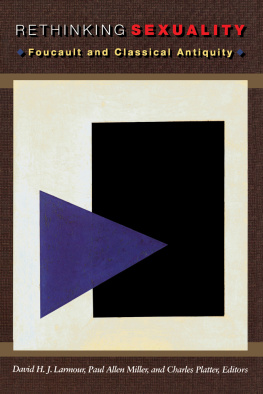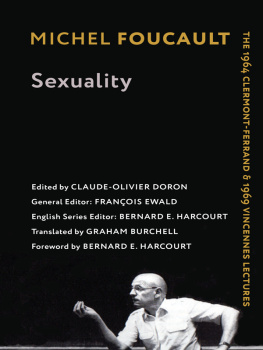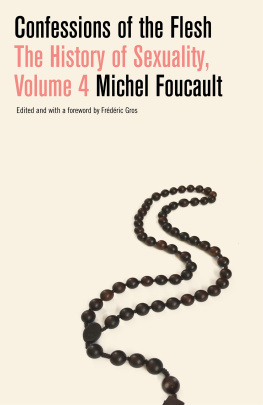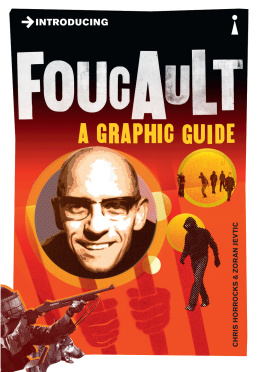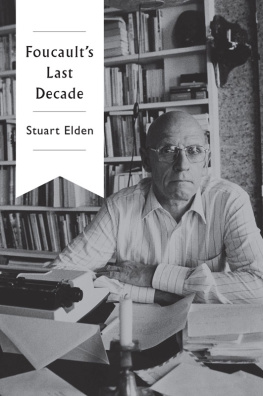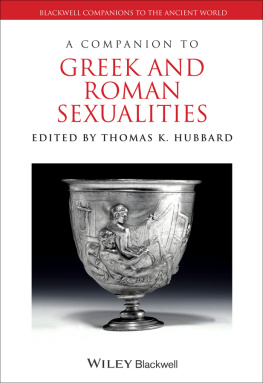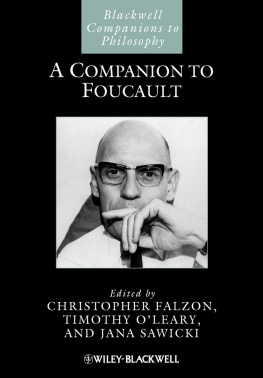RETHINKING SEXUALITY
RETHINKING SEXUALITY
FOUCAULT AND CLASSICAL
ANTIQUITY

David H. J. Larmour,
Paul Allen Miller, and
Charles Platter,
Editors
PRINCETON UNIVERSITY PRESS . PRINCETON, NEW JERSEY
COPYRIGHT 1998 BY PRINCETON UNIVERSITY PRESS
PUBLISHED BY PRINCETON UNIVERSITY PRESS, 41 WILLIAM STREET,
PRINCETON, NEW JERSEY 08540
IN THE UNITED KINGDOM: PRINCETON UNIVERSITY PRESS,
CHICHESTER, WEST SUSSEX
ALL RIGHTS RESERVED
LIBRARY OF CONGRESS CATALOGING-IN-PUBLICATION DATA
RETHINKING SEXUALITY : FOUCAULT AND CLASSICAL ANTIQUITY / DAVID H. J.
LARMOUR, PAUL ALLEN MILLER, AND CHARLES PLATTER, EDITORS.
P. CM.
INCLUDES BIBLIOGRAPHICAL REFERENCES AND INDEX.
ISBN 0-691-01680-1 (CL : ALK. PAPER). ISBN 0-691-01679-8
(PB : ALK. PAPER)
1. FOUCAULT, MICHEL. HISTOIRE DE LA SEXUALIT. 2. SEX CUSTOMS
HISTORY. 3. FEMINIST THEORY. 4. CLASSICAL LITERATURE.
I. LARMOUR, DAVID H. J. (DAVID HENRY JAMES), 1959- . II. MILLER,
PAUL ALLEN, 1959- . III. PLATTER, CHARLES, 1957 .
HQ12.F683R47 1997 306.7'09DC21 97-18650 CIP
HTTP://PUP.PRINCETON.EDU
eISBN: 978-0-691-22407-7
For Don Taylor Wilson and Philip Pingree
ACKNOWLEDGMENTS
T HE EDITORS wish to thank Dean Jane Winer and Associate Dean Otto Nelson of the College of Arts and Sciences at Texas Tech University, as well as Peder Christiansen, chair of the Department of Classical and Modern Languages and Literatures, for their courageous financial and moral support of this project from its inception. Without their support, none of this would have been possible. Thanks are also due to Wendy McCredie, Bruce Clarke, and Susan Stein for their administrative, intellectual, and moral support; to Cynthia Rosser for her incomparable poster design; and to Carolyn Starkweather and Diane S. Wood for all their help. A special debt of gratitude for scholarly and intellectual inspiration is owed to Pravu Mazumdar, John Robinson-Appels, Ellen Greene, Margot Gayle Backus, Nigel Nicholson, and Dugald Williamson. We would also like to thank John Thomas and Jackie Dumas for a production of the Lysistrata unlike any other, Jon Sandel for his extraordinary hospitality, Buddy Holly for the Walk of Fame, The Hi-D-Ho for the Mack Davis fresco, Boot City and Boot City Two, and, of course, Prairie Dog Town.
Page duBois essay The Subject in Antiquity after Foucault includes a revised version of from her book Sappho Is Burning 1995, The University of Chicago Press, which is here reprinted by permission of the press. Lin Foxhalls article Pandora Unbound: A Feminist Critique of Foucaults History of Sexuality first appeared in Dislocating Masculinity: Comparative Ethnographies, ed. Andrea Cornwall and Nancy Lindisfarne 1994, Routledge, and is here reprinted by permission of the press.
RETHINKING SEXUALITY
INTRODUCTION
SITUATING THE HISTORY OF SEXUALITY
David H. J. Larmour, Paul Allen Miller, and Charles Platter
T HE PHILOSOPHICAL and historical inquiries of Michel Foucault have always had an explicitly political dimension, and this engagement with the politics of power has, in turn, had a direct bearing on the responses his texts have generated. In an article entitled The Subject and Power, Foucault locates his theoretical analysis within a series of oppositions which have developed over the last few years: oppositions to the power of men over women, of parents over children, of psychiatry over the mentally ill, of medicine over the population, of administration over the ways people live. Not surprisingly, this concern with both the discursive oppositions and the ideology of power, as well as the scrutiny of capitalist economic structures, has often led critics to associate Foucault with structuralist and Marxist thought. While it may be accurate to speak of structuralist or Marxist tendencies in his work, his texts fit neatly into neither category. One goal of this introduction is to help situate Foucaults work more clearly in relation to these competing discourses.
Foucaults reception by feminists, gays, and lesbiansactivists as well as scholarspresents an equally complex picture. This is particularly true of his final volumes, which have drawn the attention of classicists as well. The History of Sexuality has generated multiple competing and contradictory assessments of its usefulness both for the study of sexuality and for the advancement of the claims of women and homosexuals. The three volumes and the theoretical methodologies they display have been characterized both as tools of liberation and instruments for maintaining traditional structures of gendered and sexual power.
What may be most important, however, is the success Foucault has had as a catalyst. The reaction to and debate over The History of Sexuality is ongoing and rich. It has produced many responses that not only shed light on the work of Foucault but also stand as valuable intellectual contributions in their own right. As an introduction to the essays in this volume themselves a polyphonic response of competing discourseswe here offer a brief account of Foucaults relationship to structuralism, poststructuralism, Marxism, feminism, gay and lesbian studies, and classics.
Structuralism, Poststructuralism, and Marxism
Foucaults early concern with discourse and the regularities of language led him to be identified with the structuralists, who dominated the Parisian intellectual scene in the late fifties and early sixties. This was a tag he soon rejected. The reasons for his aversion to the structuralist label go beyond a simple unwillingness to be categorized under a generalizing rubric. While he accepted structuralisms focus on the determining power of language, as well as the structuralists rejection of existential humanism and philosophies of the subject, he also saw discourse as a form of practice and not as an isolated or atemporal set of norms in the manner of Saussure. Unlike structuralists such as Todorov, Greimas, or Genette, for him, knowledge and power were inseparable; scholarship could not be above the fray.
A further area of disagreement between Foucault and structuralism lies in the fact that where the structuralists sought to map out total systems of abstract possibility (langue) that could account for all the actual variations in concrete practice (parole)whether in literature, fashion, or primitive kinship patternsFoucault consistently refused to endorse any form of totalization, preferring to concentrate on the local and the particular. His examination of history sought to offer individual diagnoses of specific problems rather than to propound teleologies showing historys inevitable path to the present. He explicitly rejected what he viewed as the imperial subtext that underlay structuralisms totalizing vision.
Rather than representing a simple continuation of the structuralist enterprise, Foucaults rejection of both master subjects and master narratives reveals much in common with those decentered and contingent forms of thought that Lyotard has characterized as the Postmodern Condition. In sum, when analyzed in terms of the work of his contemporaries, Foucaults oeuvre appears at the heart of that series of debates commonly labeled poststructuralism, a name whose diachronic reference points to that very lack of system that is its distinguishing characteristic.

